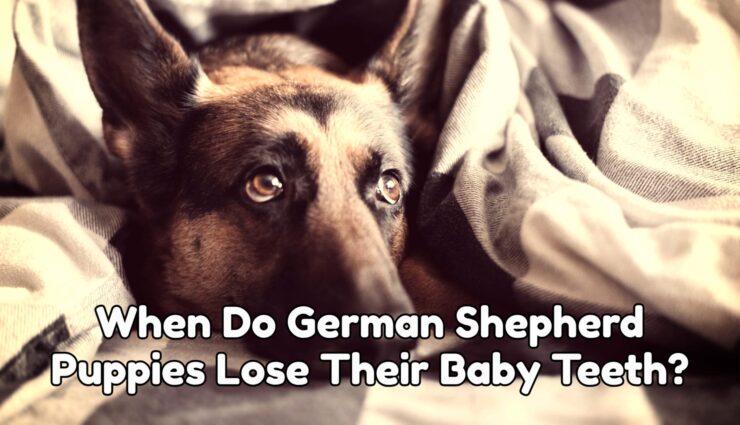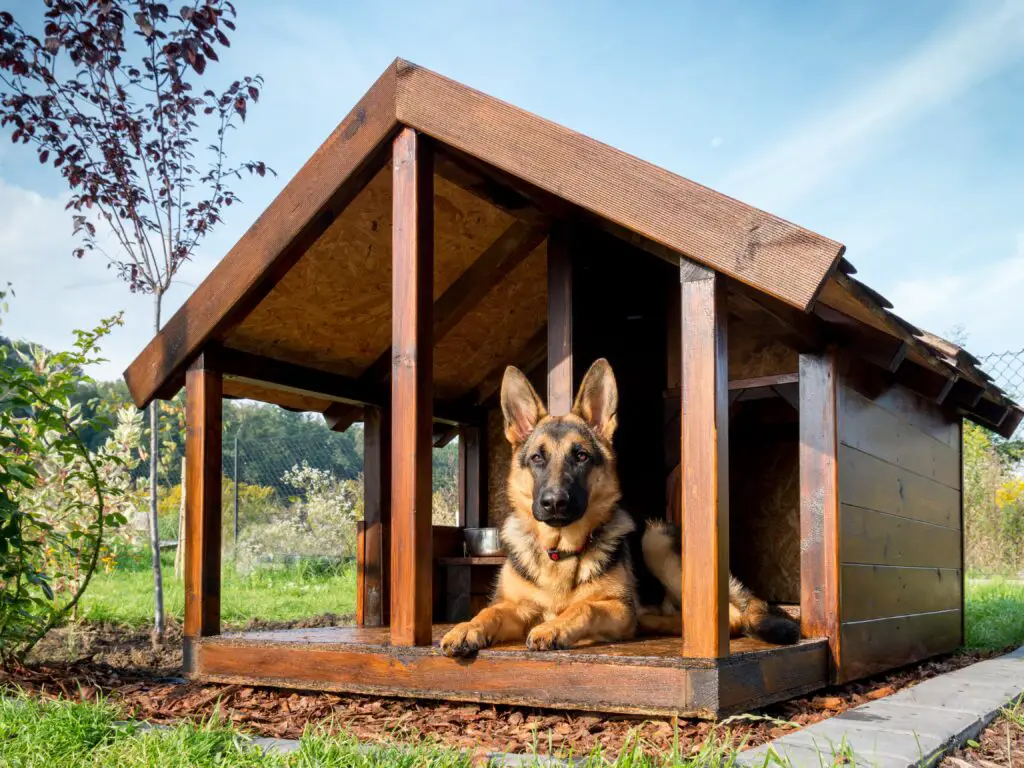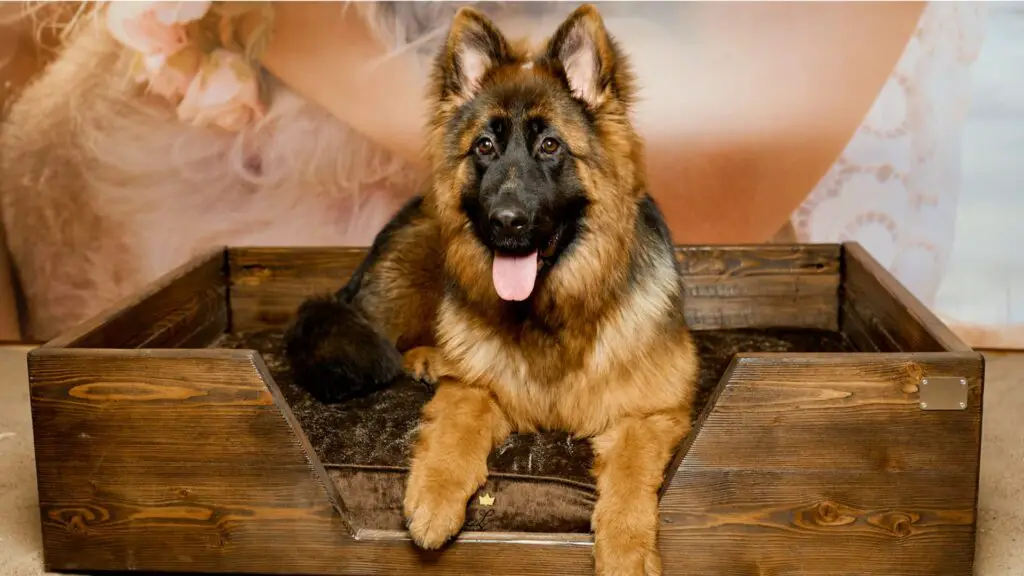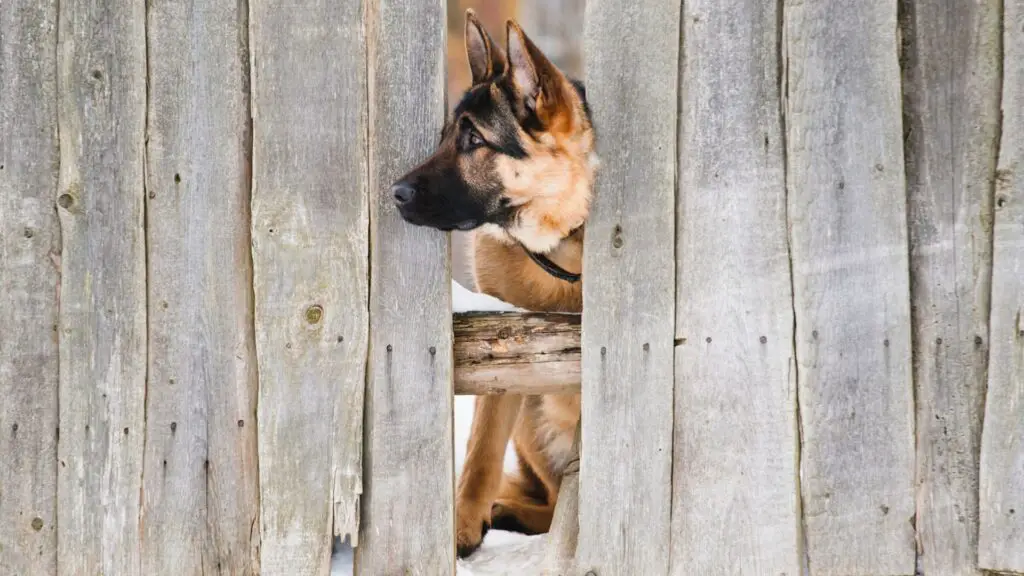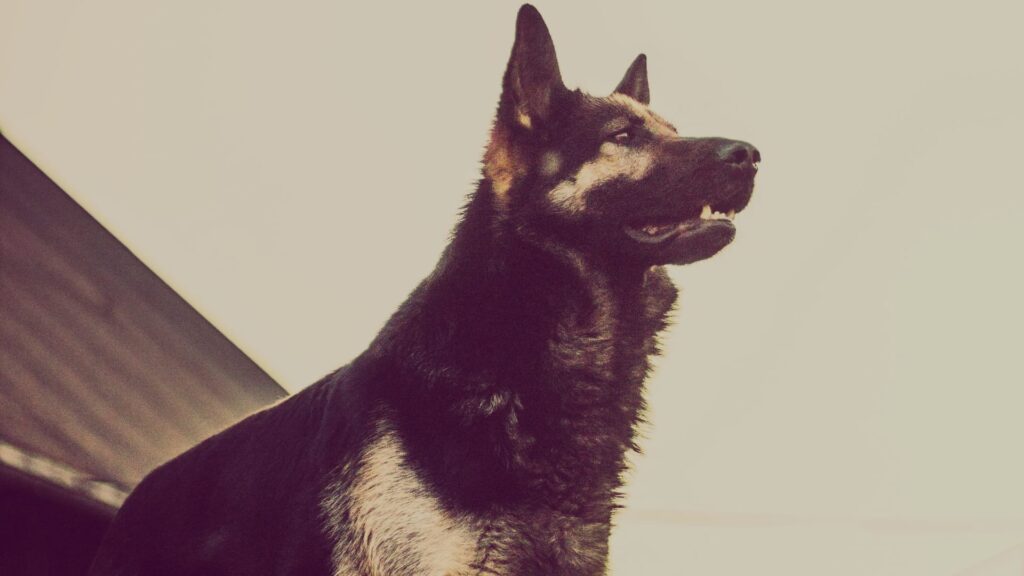The German shepherd puppy undergoes various development stages before it becomes an adult. And teething is one of them.
Like human babies, German shepherd puppies have to lose their milk teeth to give space to adult teeth.
And such a process can turn out to be dreadful for the puppy and its owner. The reason being, the pup undergoes much discomfort and pain. Whereas for the owner, he has to deal with a teething German shepherd who will bite everything in his reach.
Whether you are an owner or you aspire to own the German shepherd, this article will be appropriate for you to understand the whole teething process.
When does German shepherd Puppies Teeth Develop?
German shepherd puppies are born without teeth on their gums. If you notice that your puppy has some set of teeth after being born, it’s more of a fault.
Later on, the German shepherd puppies will start developing teeth when they reach 3- 4 weeks.
Highlight: The first teeth to appear are the incisors and the canines. Furthermore, the whole process of growing the 28 teeth’s comes at a halt by the eighth week.
When Do German Shepherd Puppies Lose Their Baby Teeth?
German shepherd puppies will not live with the milk teeth forever. They will have to shed them off to give space to the adult teeth.
The process of shedding the milk teeth often starts from week 6- 8. While at that, don’t expect all puppies in your litter to lose teeth over the same period. Like humans, puppies are individuals, and they will start this teething stage at different intervals.
Highlight: In German shepherds, the whole teething process will last for 12- 16 weeks. Whereby the puppy transitions from a 28 teethed dog to a dog with a set of 42 teeth’s-a whopping ten more teeth than us human beings.
By the time the puppy is eight months, he will have a set of new teeth ready to cause havoc.
Concurrently, with the teething, comes another set of problems that you as a dog owner, you will have to face.
First, you will experience a puppy who will mouth you and bite every object on the reach. Secondly, you will have to contend with struggles of separating puppies who cannot stop nipping on each other’s ears.
It’s a short duration that most puppy owners dread to undergo.
Worth to note, if your German shepherd puppy has a delay in terms of losing her baby teeth, consider consulting your vet.
How to Know That Your German shepherd Is Teething (Teething German Shepherd Signs and Symptoms)
The Puppy Chews Everything Available
Puppies will tend to chew on everything available in their reach to help soothe their sore gums. Anything that they find on their way will end up in their mouths, whether it’s the mop, your ankle or even your expensive shoe.
A Missing Tooth
Check on your puppy’s gum. Can you spot any gaps? Yes? Then your puppy is teething, and probably the tooth is somewhere on your yard. Or even she has swallowed it.
Don’t also be surprised when you come across some sets of teeth as you walk around your house.
Traces of Blood on Toys
When a teething German shepherd puppy loses teeth, you will spot some spots of blood on her toys and even her feeding bowl. Such traces of blood will occur after the teeth get dislodged from the gum.
Frequent Drooling
Don’t get amused when you get your puppy drooling severally. The puppy is not sick. It’s that pup’s razor-sharp teeth are falling off, and a new set of adult teeth are developing.
Physical Distress
The whole teething process comes with its new set of troubles to the puppy. Physical and emotional distress! You will note that your puppy is often gloomy.
Additionally, your puppy may lose her appetite, thus leading to weight loss.
Fever and diarrhea are also common signs that you have a teething German shepherd puppy.
How to Stop a Puppy from Biting
As earlier discussed, the whole teething processes come with much discomfort to the puppy. And to relieve the pain, dogs will tend to chew everything they find on their way.
So here is how you can control this biting behaviour.
Give Your Puppy a Wet Towel
You can take a damp towel and place it in a freezer or a fringe. Don’t let the towel become hard as it can damage the puppy’s gums.
Let the puppy play with this towel. However, supervise the puppy. Least he will swallow the piece of towel.
The frozen towel will bring on some cooling effect on her rather sore gums. Giving her the towel is another way to keep her engaged and refrain from destructive behaviors.
Ice Cube
Homemade ice cubes from chicken and beef broth can help relieve the discomfort that comes along with teething.
They bring on much desirable cooling effect similar to the one the frozen towel offers.
Take the ice cubes and gently rub them on your puppy’s gum.
Make Chamomile Tea
Chamomile is one of the ancient herbal product used to alleviate pain and sensitivity. And you can tap in that.
The most effective way you can do it is making chamomile tea for the puppy to take.
If the puppy is not interested, you can include some beef broth to make it palatable.
Puppy Chew Toys
There is a wide range of puppy toys that will come handy when your German shepherd is teething. Offer your German shepherd puppy safe chew toys that will not only soothe is his gums but also serve as a distraction from the excruciating pain.
An example of a toy is Kong wubba.
Massage Your Teething German shepherd
Though you have to be watchful, you can help ease your puppy from the discomfort of teething by frequently massaging his gums.
Frequent massages coupled up with the above measures will help to stimulate the growth of teeth on your puppy.
Overall, the above-highlighted measures will calm your German shepherd during the teething process.
Puppy Proofing Your House
It’s during the stressful moments of teething that your puppy will nip off anything near his reach. And such behaviour can spell out trouble for you and your puppy.
You wouldn’t want your puppy to start biting off wires or eating your favourite shoe polish in a bid to cool himself off.
It will help if you adopt the idea of puppy proofing.
- First, for harmful chemical and drugs, ensure they are in a secluded place high enough that your puppy cannot reach.
- Cover those naked electrical wire- you wouldn’t want your puppy to get electrocuted. Also, ensure dangling wires are kept well in place.
- Puppy proof your house by keeping her out of reach of some foods. Some foods may turn out to be poisonous on your puppy the moment he consumes them.
- Keep away those grapes and bars of chocolate.
- Use deterrent sprays.
“I will give anything near me a bite,” says a teething German shepherd. You can stop such a saying by spraying a deterrent spray on areas your German shepherd loves nibbling.
Get a deterrent spray with chilli or one with an awful smell to keep your distressed dog from biting everything valuable.
Crates
When you are not around, you will not be in a better position to monitor what your German shepherd is up to.
However, a crate or a pen will come handy.
The crate controls the puppy and ensures that your belongings are safe.
Inside the cage, you can give him an engaging toy that will not only soothe his gum, but it will also relieve the boredom that may arise when he is in a crate.
Overall crate training will be an appropriate piece of training you should train your German shepherd puppy when she hits 8 weeks.
Note: Don’t Give Your German shepherd Puppy Your Old Shoe
Most puppies love nipping off shoes as a way of soothing themselves. Consequently, I have seen people propagate such behaviour by presenting old shoes to the puppies.
Although the result will be achieved, there comes a risk. Whereby, next time when you are not around, your puppy may start nipping off any shoe around.
The puppy will not distinguish between a $10 shoe and a $150 shoes. All are equal, and the price won’t deter your puppy from biting any of them.
Exercise and Teething German shepherd Puppy
It’s a common assumption that German shepherd pups shouldn’t exercise when they are teething. That is not correct.
For a puppy, a regular exercise session will help a lot. Exercise like playing fetch and swimming will help destruct a puppy from destructive behaviour that she may develop.
Also, with the nervousness that the whole teething process comes along with, the exercise sessions and participating in engaging activities will help to calm her.
For a puppy, short sessions not exceeding 15 minutes daily will prove to be adequate.
Divide the 15 minutes session into two daily sessions, one session in the morning and another in the evening.
Training a Teething German shepherd
Is it right to train a teething German shepherd? Yes, it’s appropriate and recommended.
Worth to note the whole teething process will not destruct the training session. Teaching your puppy basic commands will be appropriate. Also, at this point of teething, crate training will prove to be efficient.
Also, with the nipping behaviour, train your German shepherd not to bite.
How to Train Your German shepherd Not to Bite
Let your German shepherd give your bite with her teeth. Then let out a high-pitched yelp and remove your hand from her mouth and walk away. The pup will become startled and wonder what happened.
With that, the puppy will associate biting with the end of play or with a startling yelp.
Alternatively, for any time that your pup gives you a hard bite, pinch her. However, don’t apply much force.
Do that several till your puppy associates biting with a painful pinch
German shepherd Teething and Erect Ears
Is there a connection between German shepherd ears perking up, and the whole process of teething? Yes, there is a connection.
The whole teething process can determine whether your German shepherd ears stand up. Most individuals associate the teething process with high calcium requirements that drain off the necessary calcium needed by the ears cartilages to stand up. However, it has been a bone of contention of whether that is true.
So during the teething process, you may note one of your puppy’s ear goes up and down severally. However, with time, both ears will stand up.
Check this article on when your German shepherd ears will stand up.
How to Keep Your German shepherd Teeth Healthy after Teething
Now that your German shepherd has 48 teeth, how can you ensure they remain sturdy?
Brush Your Dog’s Teeth Regularly
Brushing your puppy’s teeth thrice a week will prove to be sufficient for your dog. The more the brushes, the less the visits to your vet.
Consider using dog toothbrush and toothpaste. Avoid human toothpaste as it will corrode the stomach lining of the pup.
Quality Dry Food
Consider dry food rather than wet food. Wet food stick between the teeth, thus inviting the formation of plaques.
Consider consulting your vet on the best dog diet appropriate for his developing teeth.
Regular Vet Visits
Visiting your veterinary is essential. Your vet will be in a better position to examine your dog’s oral. The vet will recommend how to handle your dog’s developing teeth.
Safe Chew Toys
Besides relieving itchy gums, tug toys and other safe toys will help bring out a puppy with sturdy teeth.
While at that, here are some recommended toys.
Recommended Toys for a German shepherd Losing Teeth
Kong Puppy Toy
The Kong puppy toy is an all-round a toy that will help your teething German shepherd. Besides being a good pain-reliever, this toy will help kill boredom when your pup is inside a crate.
This Kong rubber toy is appropriate for a puppy who is developing teeth. One can stuff treats on the toy and make the puppy work them out.
Arm Hammer Ore-Play T Bone Dental Chew
A toy that will not only make your German shepherd puppy engaged but still make her teeth clean. With its grooves fused with baking soda this tool can help fight plaque as well as giving your lovely doll a fresh breath.
Tang-CN Chew Toys, Dog Toothbrush
This chew toy is non-toxic rubber toy appropriate for any teething German shepherd who has made nibbling objects as one his objectives day by day.
It’s more of a dog’s toothbrush as it has elongated soft spikes fittings. These spikes help stimulate your dog’s gums as well as keeping its dental cleanliness free of plaque.
FAQ: Why Is My German shepherd puppy still biting me?
Your German shepherd will not bite you out for no reason. He must be having an objective, he wants it fulfilled.
First, it’s either that your German shepherd is bored and he’s trying to draw your attention by biting you.
Secondly, it could be that you’ve not trained your puppy not to bite. You can refer back on this section and check on how to stop your puppy from biting.
Also, it could be that your puppy is in the process of teething, hence why he’s biting you severally.
FAQ: When Will My German shepherd stop The Biting?
With the puppy biting behaviour, many German shepherd owners wonder when their puppies will stop biting.
The German shepherd will stop the biting habit when he’s 6 months. It’s at this moment all adult teeth are in place, from the incisors to the carnassial teeth.
However, if the puppies don’t undergo puppy biting inhibition train, they may proceed with such behaviour in their adulthood.
FAQ: Why Should I Learn Why My German shepherd Lose Teeth
Knowledge is good and understanding how and why your German shepherd puppy is teething is appropriate.
In that, during this phase, you will be in a better position to understand your dog’s behaviour. And how your canine reacts when pushed to the limit.
Also, you will be in a better position of how to spot the signs and symptoms of a teething German shepherd.
You will also learn how to handle the situation and navigate the challenges that the teething process comes along.
Conclusion
Well, there is all about teething in German shepherd puppies.
Worth to note it’s a torturous stage for every pet, as the teething process comes with a lot of irritation and pain.
And it’s such a time your dog needs you most. By understanding that, you will be in a better position to learn how to handle your dog. Also, apply reliable measures that will ease up the pup’s discomfort- for example, you can purchase the highlighted toys.
Tell us, how did your German shepherd react when she was teething? And how did you handle it?

